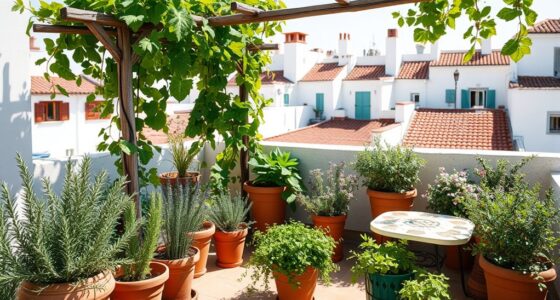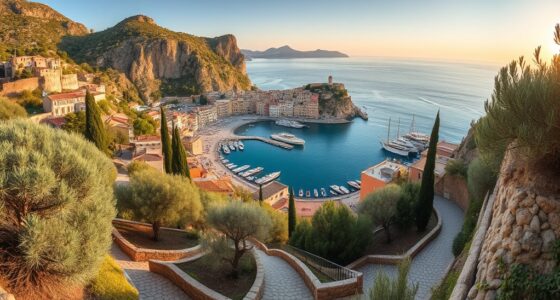You can find eco-friendly souvenirs from Sardinia that highlight traditional crafts like handmade ceramics, woven textiles, and jewelry made from local gems and sustainable silver. Support forests by choosing cork products and enjoy gourmet foods like organic olive oil, sea salt, and herbal infusions packaged in eco-friendly materials. Community workshops and local markets often offer authentic, sustainable options that preserve regional culture. Explore these options further for unique, environmentally respectful keepsakes from Sardinia.
Key Takeaways
- Handcrafted Sardinian ceramics and textiles made from sustainable materials reflect local traditions and eco-friendly production methods.
- Cork accessories like bags and bottle stoppers utilize sustainably harvested cork from FSC-certified forests.
- Jewelry featuring local gems such as obsidian and coral is crafted using traditional, eco-conscious techniques.
- Olive oil, sea salt, and herbal infusions are produced with environmentally sustainable practices and biodegradable packaging.
- Authentic Sardinian baskets and wooden decor showcase regional craftsmanship using eco-friendly, locally sourced materials.
Handmade Sardinian Ceramics and Textiles
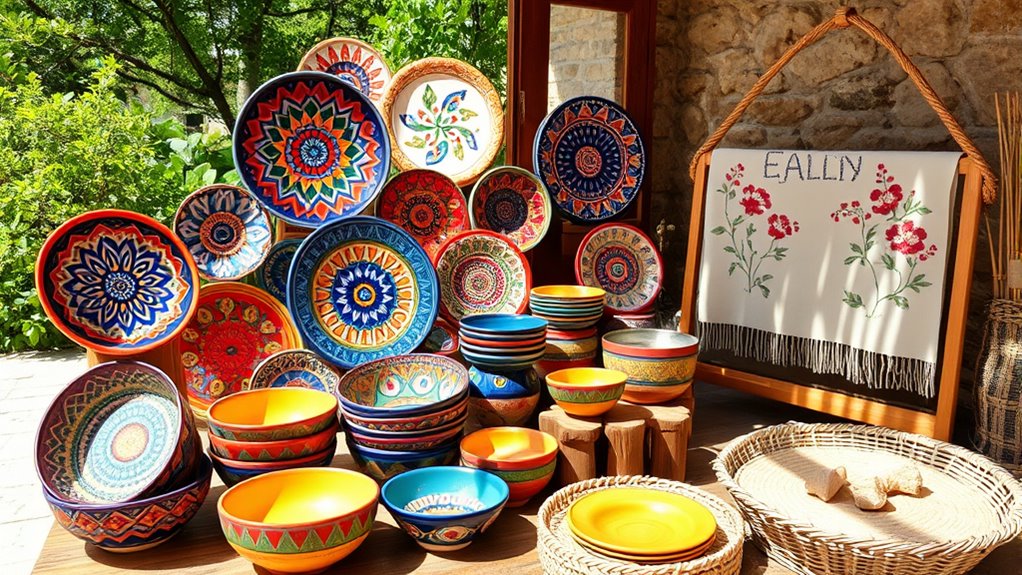
Handmade Sardinian ceramics and textiles embody a rich cultural heritage that has been preserved and refined over centuries. You’ll find that Sardinian ceramics date back to pre-Nuragic times, with archaeological finds in museums highlighting this ancient tradition. From the 17th century, a guild regulated ceramic forms while encouraging decorative creativity influenced by Spanish styles. Common shapes include two-handled jugs from Oristano and hen-shaped vessels from Dorgali, often given as bridal gifts. Skilled artisans shape pottery using traditional tools like the potter’s wheel and decorate with vibrant geometric and floral motifs. In textiles, natural sheep’s wool and locally sourced dyes create intricate carpets and fabrics with repetitive patterns and unique techniques like pibiones. Today, contemporary artisans blend tradition with modern design, keeping Sardinian craftsmanship alive and eco-friendly. Incorporating energy-efficient processes and sustainable materials, these artisans ensure their work remains environmentally conscious.
Traditional Sardinian Jewelry With Local Gems

Sardinian jewelry reflects the island’s rich cultural heritage, showcasing masterful techniques and locally sourced gems that have been passed down through generations. You’ll find intricate filigree work, where fine gold or silver threads are woven into delicate patterns. The granulation technique, featuring tiny metal spheres, symbolizes fertility and prosperity. Hand-engraving (chasing) adds detailed motifs, while repoussé creates raised, embossed designs. Local gems like obsidian and coral are often incorporated, adding color and cultural significance. The use of local materials not only highlights sustainable practices but also preserves traditional craftsmanship rooted in the island’s history. Additionally, these jewelry pieces often incorporate sustainable practices, ensuring that traditional methods support both cultural preservation and environmental responsibility. Some key points include: 1. Filigree and granulation showcase refined craftsmanship. 2. Obsidian and coral carry symbolic meanings. 3. Jewelry passed down as heirlooms reflects family and cultural ties. 4. Traditional techniques blend with modern adaptations for eco-friendly, authentic souvenirs.
Cork Products From Sustainable Forests

Cork products from sustainable forests offer a unique blend of ecological benefits and economic value, making them an ideal eco-friendly souvenir choice. Sardinia’s cork oak forests generate about €93 per hectare annually from cork, while also providing €37 for fodder, €37 for carbon capture, and €261 for water yield. Every 11 years, cork harvesting can produce around €1023 per hectare, supporting local economies. These forests are biodiversity hotspots, helping maintain ecosystem health through careful management and FSC certification. Cork harvesting respects tradition and tree health, with some trees over 300 years old. This sustainable practice guarantees ongoing ecological benefits and economic sustainability. Additionally, the forests contribute significantly to biodiversity conservation, ensuring the preservation of native species and ecosystems.
Locally Produced Gourmet Food Gifts
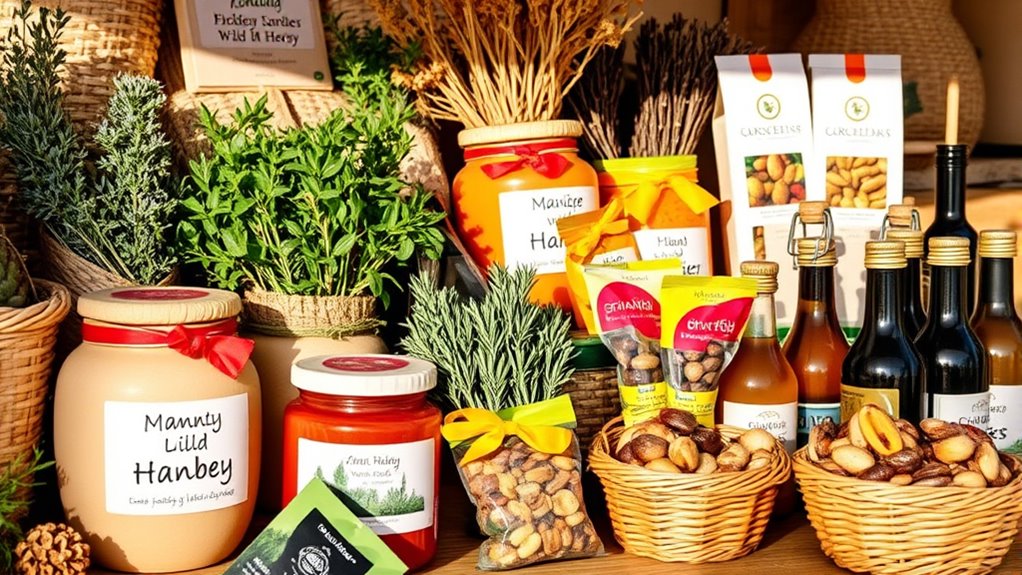
If you’re looking for authentic souvenirs that capture Sardinia’s rich culinary heritage, locally produced gourmet food gifts offer an exceptional choice. These items reflect the island’s traditional flavors and craftsmanship, making them perfect keepsakes or gifts. Here are four standout options:
Discover Sardinia’s culinary treasures with authentic, locally crafted gourmet food gifts—perfect eco-friendly keepsakes or gifts.
- Cured Meats – Organic prosciutto, pancetta, and salami showcase Sardinia’s quality and natural rearing methods.
- Cheeses – Pecorino Fiore Sardo, made from sheep grazing freely, delivers bold, authentic flavors.
- Smoked Fish – Smoked swordfish and tuna offer a taste of the Mediterranean’s rich seafood tradition. The artisanal processes involved often adhere to traditional techniques, ensuring authentic flavor and quality.
- Pasta – Handmade shapes like Culurgiones and Malloreddus highlight Sardinia’s culinary artistry. Regional recipes and traditional techniques ensure these pastas retain their unique regional character.
Eco-Friendly Olive Oil and Saffron
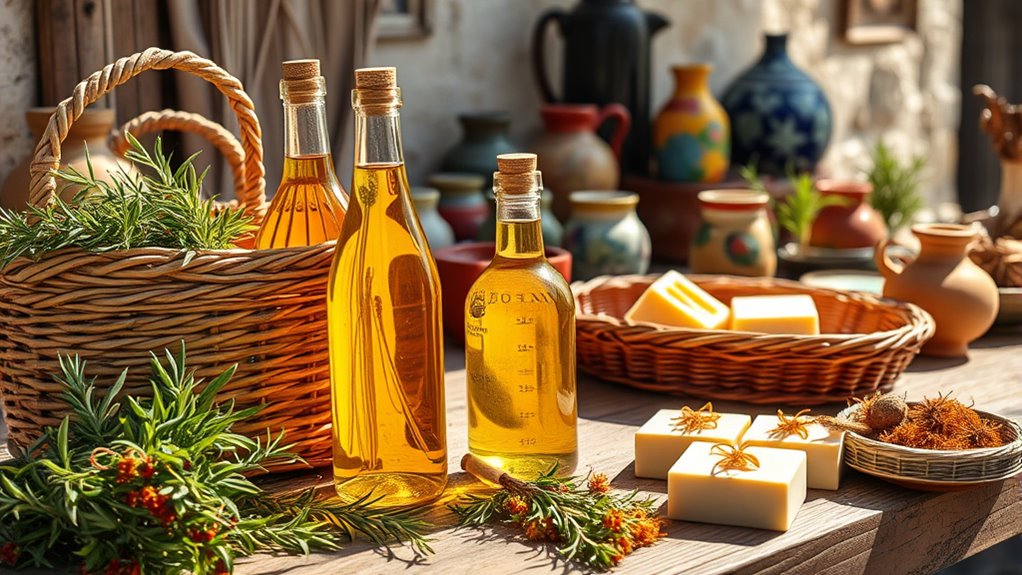
Organic olive oil and saffron from Sardinia exemplify the island’s commitment to sustainable and eco-friendly practices. Sardinian producers grow DOP Sardinia Organic extra virgin olive oil from the Bosana cultivar, using organic farming principles that protect the environment. Olives are harvested by hand or semi-mechanically at peak ripeness to prevent tree damage, then processed within 12 hours using cold extraction to preserve flavor and aroma. Modern mills employ advanced, water-saving technology and temperature-controlled systems to maximize quality and reduce waste. Packaging emphasizes dark glass bottles and BPA-free materials to prevent light exposure and contamination. Sustainable cultivation methods, including organic pest management and crop diversification, support long-term orchard health. These eco-friendly practices guarantee you enjoy high-quality, environmentally responsible olive oil and saffron as authentic Sardinian souvenirs. Additionally, adopting regenerative agriculture techniques can further enhance soil health and biodiversity in the region.
Natural Sea Salt and Herbal Infusions

You can enjoy Sardinian natural sea salt and herbal infusions, which are harvested with a focus on sustainability and respect for the environment. Local herbal blends are crafted using wild, responsibly collected plants, enhancing their authentic flavor and health benefits. These eco-friendly products often come in biodegradable packaging, making them perfect souvenirs that support the island’s natural beauty and tradition. Salt production in the Mediterranean involves traditional evaporation methods that align with eco-conscious practices, ensuring minimal environmental impact. Additionally, sustainable harvesting methods help preserve the native flora used in herbal infusions for generations to come.
Harvesting Sea Salt Sustainably
Sardinian salt harvesting exemplifies a harmonious blend of tradition and sustainability. You benefit from methods that rely on natural elements like sun, wind, and climate, reducing energy use and ecological impact. The process involves channeling seawater into evaporation ponds, where it naturally concentrates before salt crystallizes. To maintain ecological balance, harvesting occurs mainly from September to November, avoiding rainy months and protecting habitats. Here are key aspects:
- Salt pans support diverse wetland ecosystems, hosting over 35,000 waterfowl.
- Harvesting aligns with seasonal cycles, minimizing environmental disturbance.
- Maintenance allows ecosystems to recover, ensuring long-term sustainability.
- Traditional raking and covering practices preserve salt quality without chemicals. Traditional methods rely on solar evaporation, a process that minimizes energy consumption and environmental impact. This approach ensures the production of pure, mineral-rich Sardinian sea salt in harmony with nature. Additionally, careful management of the salt pans promotes biodiversity preservation, further supporting ecological health.
Local Herbal Blends
Harnessing Sardinia’s rich natural biodiversity, local herbal blends combine wild herbs with natural sea salt to create flavorful and health-boosting souvenirs. You’ll find herbs like myrtle, with its aromatic, slightly bitter notes and anti-inflammatory properties, paired with sea salt to enhance both flavor and wellness. Wild fennel adds a distinct anise-like aroma and supports digestion, while rosemary and thyme offer antioxidant benefits and savory depth. Lavender and chamomile provide floral, calming qualities, perfect for relaxation. These blends are often used in herbal infusions and seasoning salts, connecting you to Sardinia’s traditional herbal practices. Sardinia’s diverse flora contributes to the unique character of each blend, ensuring a truly authentic experience. By choosing these eco-friendly products, you embrace sustainable harvesting methods and enjoy a natural gift that preserves Sardinia’s biodiversity and health traditions in every sprinkle or sip. Incorporating wild herbs harvested sustainably ensures the preservation of Sardinia’s unique plant species for future generations.
Eco-Friendly Packaging
Eco-friendly packaging options for Sardinian sea salt and herbal infusions are gaining popularity among consumers who value sustainability and quality. Choosing the right packaging enhances product appeal and supports environmental goals.
Here are some effective options:
- Glass jars – Non-reactive, preserve salt quality, and boost perceived luxury, increasing sales by up to 25%. The transparency of glass also allows customers to see the product clearly, emphasizing purity and freshness.
- Paper bags – Biodegradable, recyclable, and eco-friendly, potentially expanding market share by 15%, though with moderate moisture protection. Proper sealing techniques are necessary to maintain product integrity over time.
- Cardboard boxes – Durable, recyclable, ideal for bulk salt, and protect against moisture with internal layers. Incorporating recyclable materials into packaging aligns with sustainability efforts and appeals to eco-conscious buyers.
- Compostable pouches – Sustainable, lightweight, and maintain mineral content, reducing plastic waste. Proper sealing techniques are essential to ensure moisture resistance and product freshness with these pouches. Additionally, these pouches can be customized with biodegradable inks and adhesives to further enhance their eco-friendliness.
Community-Led Eco-Tourism and Artisan Workshops
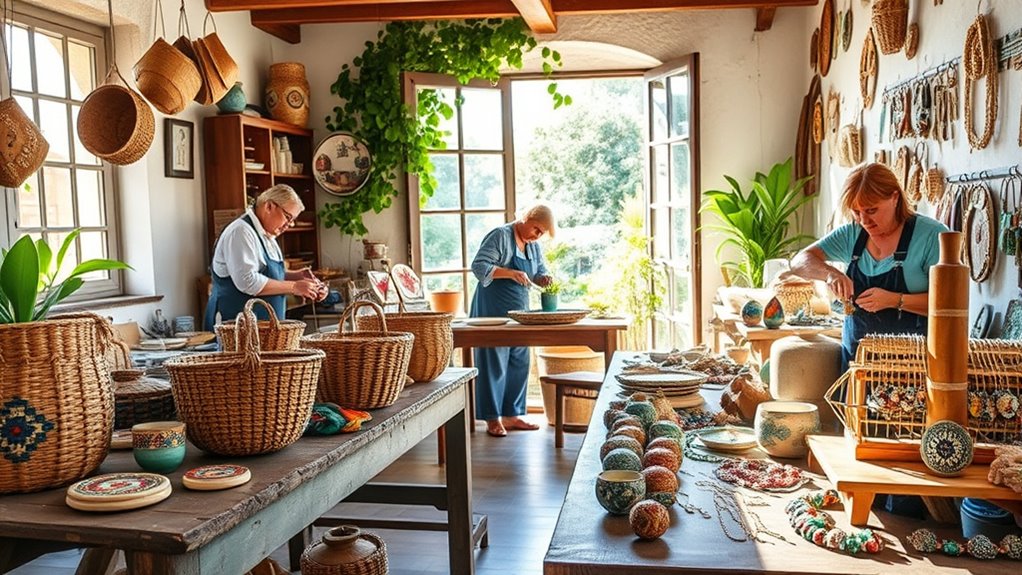
You can experience Sardinia’s rich cultural heritage through community-led eco-tourism and artisan workshops that support local crafts. These initiatives empower artisans to use sustainable materials and traditional techniques, ensuring that cultural traditions thrive. By engaging with these authentic experiences, you help promote sustainable tourism practices that benefit both the environment and local communities. Additionally, fostering emotional support within these communities can enhance visitor experiences and strengthen local resilience. Year-round tourism strategy emphasizes the importance of preserving Sardinia’s cultural, historical, and environmental heritage through such sustainable initiatives.
Supporting Local Artisans
Supporting local artisans is a key aspect of community-led eco-tourism in Sardinia, where traditional crafts are preserved through hands-on workshops and cultural engagement. By participating, you help sustain ancient techniques and promote sustainable practices. Here are some ways your support makes a difference:
- Filigree Workshops: You learn and help keep alive Sardinia’s intricate jewelry-making traditions.
- Textile Weaving: You engage in weaving local fibers into carpets and linens, preserving cultural heritage.
- Basket-Making: You join workshops creating symbolic baskets like the “guitza,” strengthening community bonds.
- Economic Support: Your participation boosts local economies, creating jobs and encouraging artisans to continue their craft.
Traditional Sardinian textile and fiber arts play a vital role in cultural preservation and economic development.
Your involvement directly contributes to cultural preservation and sustainable development in Sardinia.
Promoting Cultural Heritage
Community-led efforts in Sardinia are playing a vital role in promoting the island’s rich cultural heritage through immersive workshops and vibrant festivals. These initiatives help preserve traditions like weaving, ceramics, and stone carving, using eco-friendly, locally-sourced materials. By integrating these workshops into tourism, visitors gain authentic cultural experiences while supporting local artisans. Festivals showcasing Sardinian music, dance, and storytelling create dynamic platforms for artisans, fostering cultural pride and economic growth. To maximize impact, communities are adopting digital tools such as virtual tours and social media campaigns, increasing accessibility and awareness. The table below highlights key aspects of these efforts:
| Initiative | Focus | Impact |
|---|---|---|
| Artisan Workshops | Traditional crafts | Cultural preservation |
| Festivals | Music, dance, storytelling | Tourist engagement |
| Digital Platforms | Virtual tours, social media | Broader cultural reach |
The efforts are supported by UNESCO recognition, which can significantly increase international interest and funding for these initiatives.
Sustainable Tourism Practices
Sustainable tourism practices in Sardinia focus on balancing visitor experiences with environmental preservation and cultural integrity. Community-led eco-tourism initiatives limit visitor numbers at key beaches like Tuerredda and Pelosa through digital booking systems, protecting natural habitats. Regional development plans actively involve local communities, promoting year-round engagement in sustainable tourism that supports villages and cultural heritage. These strategies foster authentic hospitality while reducing environmental impact. Consider these key approaches:
- Strict visitor limits and digital booking systems
- Community participation in tourism planning
- Supporting local villages beyond peak seasons
- Managing resources to prevent overuse and preserve ecosystems
Additionally, artisan workshops emphasize traditional crafts using eco-friendly materials. These workshops educate visitors on sustainable practices, preserve cultural assets, and supply locally sourced products. Measures to combat over-tourism, such as visitor caps and fines for violations, together, these efforts create a more sustainable, culturally rich tourism model in Sardinia.
Unique Sardinian Crafts and Home Decor
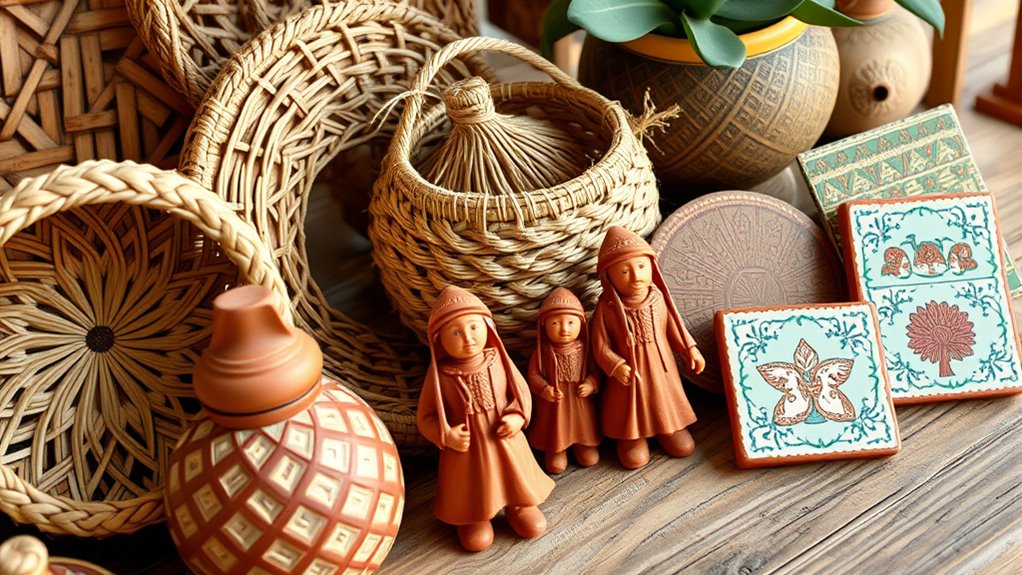
Discover the rich craftsmanship of Sardinia through its unique home decor and artisanal products, where traditional techniques blend seamlessly with eco-friendly materials. You’ll find handwoven textiles with geometric and striped patterns, dyed with herbs and lichens, often made by women using wooden looms. Sardinian ceramics showcase nature-inspired motifs, crafted from local clay with sustainable firing methods. Wicker and plant fiber baskets, shaped for both function and beauty, reflect regional styles passed down through generations. Wooden furniture and decor emphasize minimalist, rustic designs using local, sustainable wood. Cork crafts, made from Sardinian oak trees, create eco-friendly accessories like bags and bottle stoppers. These crafts embody cultural heritage while supporting eco-conscious living.
| Craft Type | Materials & Techniques |
|---|---|
| Textiles | Wool, cotton; natural dyes |
| Ceramics | Local clay; hand-painted |
| Wicker | Mediterranean vegetation |
| Woodwork | Sustainable local wood |
Ethical Practices in Production and Harvesting

Ethical practices in Sardinian craft production and harvesting center on respecting both the environment and the artisans behind each piece. You’ll find artisans prioritize organic fibers and natural dyes to reduce environmental impact. They use local materials like native sheep wool, clay, and aromatic herbs, promoting sustainable land use. Additionally, they often upcycle and repurpose materials, minimizing waste. Energy-efficient techniques help lower the carbon footprint by around 30%. To support fair and safe work environments, wages are fair, and conditions are healthy, ensuring community well-being. Supporting these crafts sustains local economies and preserves cultural heritage. Here are key points: 1. Use of eco-friendly materials and natural dyes 2. Fair wages and safe working conditions 3. Sustainable harvesting and land management 4. Upcycling and energy-efficient processes which reduces overall environmental impact.
Frequently Asked Questions
How Do Sardinian Artisans Ensure Sustainable Sourcing of Materials?
You might wonder how Sardinian artisans keep their materials sustainable. They prioritize local resources like sheep’s wool, flax, hemp, and cotton, sourcing them directly from nearby farms and herders. This reduces transportation emissions and supports the regional economy. They also collaborate with local communities, use traditional techniques, and choose natural dyes, ensuring their raw materials are eco-friendly and maintain Sardinia’s cultural heritage.
Are Eco-Friendly Souvenirs More Durable Than Conventional Alternatives?
You get what you pay for, and eco-friendly souvenirs often outlast conventional ones. They’re crafted with high-quality, sustainable materials like FSC-certified wood, bamboo, or recycled plastics, making them more durable. You’ll find they resist wear and tear better, often becoming keepsakes rather than discardable items. Plus, their timeless design means they stay relevant longer. In the long run, eco souvenirs save you money and reduce waste, truly standing the test of time.
Can Purchasing These Crafts Support Local Sardinian Communities Long-Term?
Purchasing eco-friendly crafts can support local Sardinian communities long-term by directly channeling income to skilled artisans and multi-generational workshops. Your choices help preserve traditional techniques, foster cultural pride, and encourage sustainable livelihoods. By choosing these products, you also promote environmentally responsible practices that protect natural resources. This sustainable support strengthens regional economies, sustains cultural heritage, and ensures that local communities thrive while maintaining their unique identity for future generations.
What Certifications Verify the Eco-Friendly Practices of Sardinian Artisans?
When it comes to verifying eco-friendly practices, certifications are the proof in the pudding. You’ll see labels like DOP Sardinia Organic, EU Organic, and G.A.P., which confirm sustainable farming, organic methods, and responsible production. These certifications guarantee artisans follow strict environmental standards, giving you confidence that your purchase supports eco-conscious traditions and long-term community well-being. So, you can buy with peace of mind, knowing you’re making a positive impact.
How Do Eco-Souvenirs Contribute to Sardinia’s Environmental Conservation Efforts?
You see, eco-souvenirs help Sardinia’s environmental conservation by promoting sustainable practices. When you buy these items, you support local artisans who use eco-friendly materials, reducing waste and pollution. Your choice encourages responsible tourism, raises awareness about ecological issues, and funds conservation projects. By choosing eco-souvenirs, you actively participate in preserving Sardinia’s biodiversity, traditional farming, and natural resources, making a positive impact on the island’s environment.
Conclusion
By choosing these eco-friendly Sardinian souvenirs, you’re not just taking home a gift—you’re embracing a piece of paradise that’s alive, vibrant, and bursting with sustainable spirit. Imagine holding a handcrafted ceramic, feeling the rich textures of local textiles, or savoring the purest olive oil that embodies the island’s heart. Every item is a tiny miracle of nature and tradition, transforming your memory into an everlasting celebration of Sardinia’s breathtaking eco-essence.



